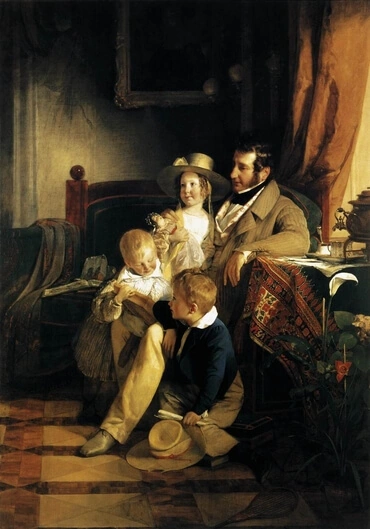Father

Father in the Word means what is most interior, and in those things that are following the Lord's order, it means what is good. In the highest sense Father means the Lord Himself, the creator. In the generation of natural children it is the father who provides the soul or the most interior receptacle of life, and an internal heredity, and the mother who provides all of the substance that the soul uses to form its body, plus an external heredity. In this process the soul comes from the Lord through the father, and not from the father, since all life is from the Lord. The wise person calls the Lord his father and the church his mother because his interior loves come from the Lord, but are given form and actuality through the truths taught by the church. Those things thus brought forth are a person's spiritual "children". In the New Testament, when speaking of Jesus and the Father, what is meant is the outward manifestation with the divine itself as the soul inside. Because Jesus was born from a natural mother, He had a natural body and a natural Jewish heredity. Throughout his life as He was tempted by the hells, He slowly put off all he had from His mother and replaced it with what He had from Himself inside, the Father. In doing this he made himself one with the Father that was His inmost so He could truly say, "I and my Father are one".
Arcana Coelestia # 2231
2231. 'That he will command his sons, and his house after him, and they will keep the way of Jehovah to do righteousness and judgement' means that from Him comes the entire doctrine of charity and of faith. This becomes clear from the meaning of 'son', 'house', 'way', 'righteousness', and 'judgement', which in short, or when their several meanings are converted into one, mean the entire doctrine of charity and of faith. For 'sons' means all who are governed by truths, 'house' all who are governed by goods, 'way' means the doctrine of faith which they are taught, 'righteousness' that doctrine in regard to good, 'judgement', in regard to truth. Doctrine regarding good is the doctrine of charity, while doctrine regarding truth is the doctrine of faith.
[2] In general there is only one doctrine, that is to say, the doctrine of charity, for, as stated in 2228, all things of faith have charity in view. No other difference exists between charity and faith than that which exists between willing what is good and thinking what is good - for one who wills what is good also thinks what is good - thus than that which exists between will and understanding. People who reflect on the matter know that the will is one thing and the understanding another. The same is also well recognized in the learned world, and it is plain to see in the case of those who will what is evil and yet from thought utter what is good. From such persons it is evident to anyone that the will is one thing and the understanding another, and thus that the human mind is divided into two parts which do not then make a single whole. Yet man was created in such a way that those two parts should constitute one single mind, and no other difference should exist between them than, to use a comparison, between that of a flame and the light shining from it. Love to the Lord and charity towards the neighbour were to be like the flame, and all perception and thought like the light shining from it. Thus love and charity were to constitute the whole of perception and thought, that is, to exist in every single part. Perception or thought regarding the essential nature of love and charity is that which is called faith.
[3] But because the human race started to will what was evil, to hate the neighbour, and to practice revenge and cruelty, with the result that the part of the mind called the will was completely corrupted, men started to make a distinction between charity and faith, and to attribute to faith all those matters of doctrine which belonged to their religion and to refer to them by the single term faith. At length they went so far as to say that people could be saved by faith alone, by which they meant their doctrine. They said that provided they believed that doctrine people could be saved no matter how they lived. Charity was accordingly separated from faith, and when that happens it is nothing else, to use a comparison, than some kind of light that has no flame, like sunlight in winter-time which is so cold and icy that the earth's vegetation languishes and dies. But faith that is derived from charity is like the light of spring-time and summer-time which causes all things to sprout and come into flower.
[4] The same may also be recognized from the fact that love and charity are celestial flame, while faith is the spiritual light that shines from it. This is also how faith and charity make a perceptible and visual presentation of themselves in the next life, for in that life the Lord's celestial manifests itself before the angels by means of a flaming radiance like that of the sun, while the Lord's spiritual manifests itself by means of the light shining from this; and that radiance and light act upon the angels and spirits interiorly according to the life of love and charity existing with them. This is the source of the joy and happiness in the next life with all their variations. These considerations show the implications of the assertion that faith alone saves.






